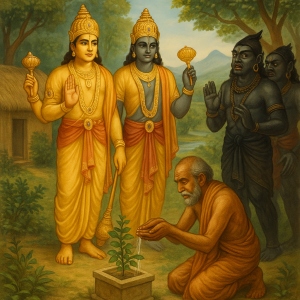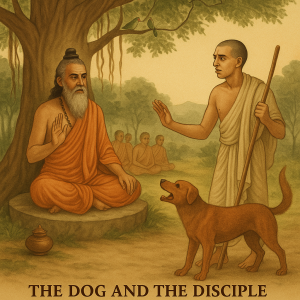The Humble Scholar and His Load
In a quiet village nestled near the edge of a dense forest, lived an old Vaiṣṇava scholar, who spent his days reciting the Purāṇas and Śrīmad-Bhāgavatam to anyone willing to listen. Though his body was frail, his voice remained strong, resonating with the nectarean glories of Lord Nārāyaṇa.
Due to his poverty, the scholar could not afford horses or oxen. Instead, he used an old, weary donkey to carry his sacred texts from village to village. The donkey, though dull and unaware, bore the heavy load of scriptures every day without complaint, walking through mud, sun, and thorny paths.
Years of Silent Service
For many years, the donkey remained the scholar’s constant companion. It would stand patiently outside temples and dharma-śālās while the brāhmaṇa recited verses inside. Though no one ever offered the donkey prasāda or blessings, it continued to serve—carrying books glorifying the Lord, unknowingly serving the cause of dharma.
Eventually, one morning, the donkey collapsed on the road and died.
The Divine Elevation of a Donkey
As the villagers came to assist the grieving scholar, they were stunned to see Viṣṇudūtas descending from the sky, bearing garlands and a glowing chariot. The celestial beings stood over the donkey’s body and proclaimed:
“Though this being was born in a donkey’s form, it has daily carried the scriptures that glorify the Supreme Lord. Such association, even without knowledge or intention, is spiritually transformative. The Lord is pleased with even unconscious service. This soul has been cleansed and now ascends to Vaikuṇṭha-loka.”
The donkey’s soul, now shining like a golden flame, rose up and departed with the Viṣṇudūtas—while the villagers stood in awe.
Lessons to Be Learned:
- Even unconscious service to the śāstra and devotees has immense spiritual value.
- Carrying, touching, or hearing the Lord’s glories purifies all living beings—even animals.
- The Lord rewards sincerity and proximity to bhakti, even if the soul is unaware of the benefit.
- As stated in the Padma Purāṇa: “na jñānaṁ na tapo vāpi na dānaṁ na vratāni ca / harer nāma-smṛter anyat na puṇyaṁ śreṣṭhataraṁ bhavet”
“Neither knowledge, nor austerity, nor charity, nor vows—nothing is superior to remembrance of the holy name of Lord Hari.”
Origin of the Story: Padma Purāṇa – Stories section glorifying the power of serving the scriptures and highlighting how even animals can be liberated through such sacred contact.

